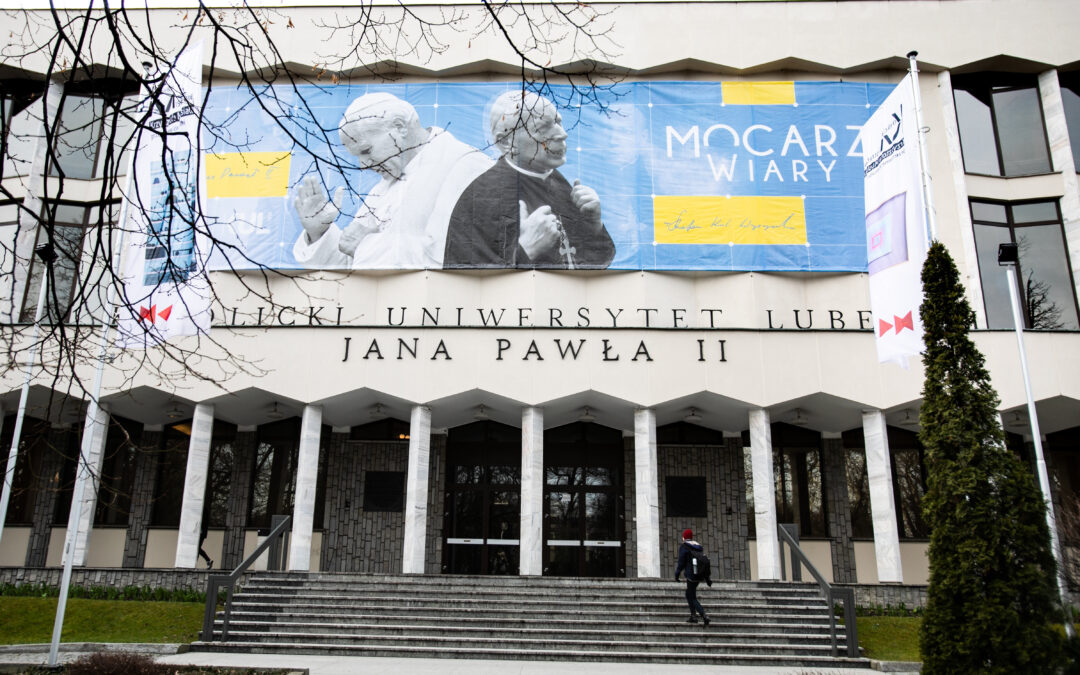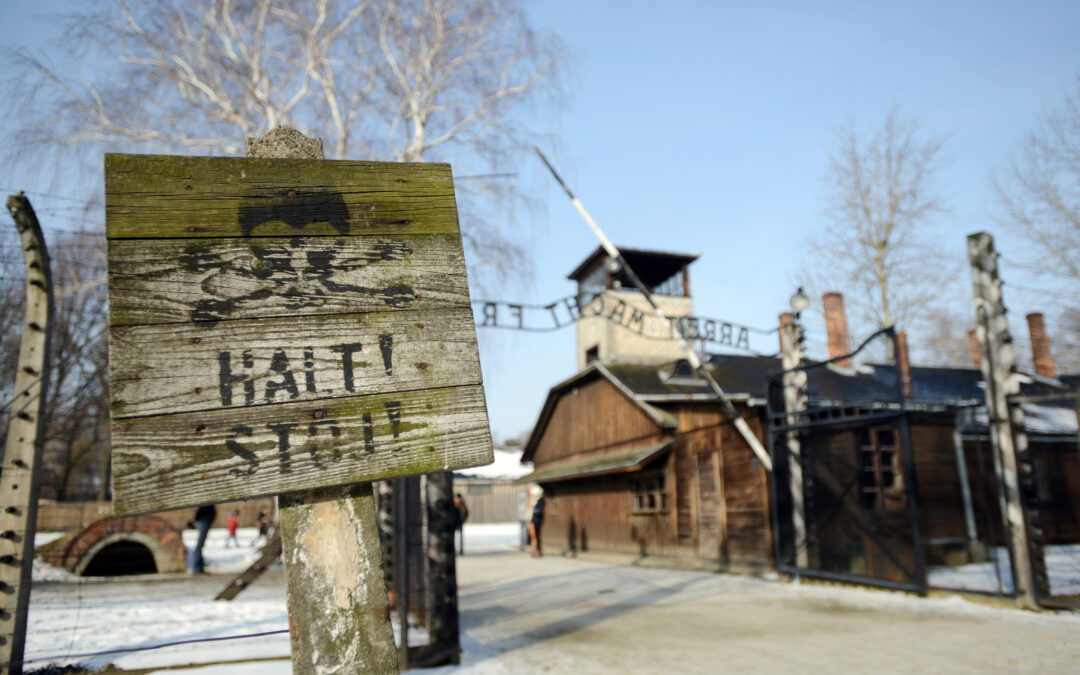By Anna Gmiterek-Zabłocka, TOK FM (tekst dostępny również w wersji polskiej)
There are few institutions in which Poland’s current ideological splits are more visible than at the Catholic University of Lublin. These differences are illustrated in particular by two of its academic staff: a priest professor who has stood in defence of an LGBT activist, and Poland’s new education minister, a legal scholar from the university, who has played a part in the government’s anti-LGBT campaign.
Founded in 1918, the John Paul II Catholic University of Lublin (known by its Polish initials KUL) has long reflected the various strands of Catholic thought in Polish society – some more liberal, some more conservative, or even radical. This divide has become particularly stark this year in the context of the debate over LGBT rights in Poland, with some figures in KUL expressing support for activists’ right to protest, while others condemn “LGBT ideology”.
The Catholic University of Lublin was for years perceived as an institution open to everyone, where all have the right to their own opinion, even if it is not especially popular. Today, say some of its graduates, the university has changed and lurched “to the right”, often taking the side of the current government.
Two of the university’s employees in particular who have been in the public eye this year seem to embody the divide between the liberal Catholic tradition and more radical, intolerant views. One, who signed a letter as guarantor for an imprisoned LGBT activist, faces disciplinary action from the university. The other, who has made a number of derogatory statements demonising the LGBT community, has just been appointed education minister, to the approval of his employer.
A history of activism
The university, whose motto is “Deo et Patriae” – service to God and the homeland – is a private college affiliated to the Catholic church in Poland, but operating in the same way as public universities. On the strength of the Concordat between the country and the Vatican, it is mainly funded from the state budget. As well as educating priests in its theology faculty, it also teaches thousands of lay students on degrees including law, administration, languages, history of art, sciences, and recently also nursing.
During the communist period, when Poland was closely affiliated with and dependent on the Soviet Union, young activists from various dissident movements arrived at KUL after expulsion from other Polish universities. In the Stalinist era in 1949, the university rector, Rev. Antoni Słomkowski, opposed the formation of a communist party organisation at KUL and was dismissed, then accused of contacts with the USA, arrested and imprisoned. The university was also constantly surveilled by the secret police.
In the 1980s, students and lecturers were active in the Solidarity trade union, published secret newspapers and periodicals, and held clandestine meetings and prayers.
Karol Wojtyła spent almost a quarter of a century working at KUL, from October 1954 until the conclave in 1978 when he was elected Pope John Paul II, and was head of the ethics department in the Faculty of Catholic Philosophy.
The ethics department head facing disciplinary action
In recent years, the same department has been headed by Reverend Professor Alfred Wierzbicki. Earlier this year, KUL announced that its disciplinary commissioner would be dealing with media comments made by Wierzbicki, but did not specify which ones. If the professor is deemed to have broken the rules of the university statute, his case could be referred to the disciplinary committee, which has the right to discipline him. Possible penalties are listed in the higher education act: from admonishment to being stripped of the right to perform the profession of academic teacher.
The likely source of the disciplinary proceedings against Wierzbicki is the fact that he was one of 12 people who acted as guarantors for Margot, a nonbinary LGBT activist whom a court had ordered to be detained for two months ahead of a trial relating to an attack on an anti-LGBT van.
According to the guarantors – who also included Poland’s chief rabbi as well as two other priests – the detention was a disproportionate punishment, especially as Margot had not tried to hide. An appeals court later agreed, overturning Margot’s detention and freeing her ahead of her trial.
KUL have not quoted which of Wierzbicki’s words were inappropriate or incompatible with the teaching of the church in Poland, instead invoking the university statute.
This statute states that: “the university’s church faculties may employ as academic lecturers people who belong to the Catholic church and are characterised by integrity in their lives, pureness of doctrine and diligence in fulfilling their duties”.
Defending minorities
This is not the first instance of Wierzbicki speaking his mind to defend minorities and stand with those who suffer. During the global migration crisis, when the Polish government categorically opposed taking in refugees, he disagreed.
“In the past, followers of Judaism were presented as vermin, while today the same language is used for refugees. Society are told that these people will only bring bugs and disease,” he said at a meeting in Lublin.
When a campaign against sexual minorities began in Poland, with individual municipalities adopting anti-LGBT resolutions and extreme homophobic comments being made in the public space, Wierzbicki made it clear that he disagreed with this unhumanitarian and inhumane treatment.
“We have a terrible thing in Poland. Unfortunately, the homophobic campaign came from church circles. Just think of Archbishop Jędraszewski’s very degrading words about a ‘rainbow plague’,” he said in an interview with Gazeta Wyborcza in August 2020, referring to the Archbishop of Kraków.
“Adhering to ethical principles cannot mean a lack of tolerance. The catechism of the Catholic church teaches that one must refer to homosexual people with sensitivity,” he added.
After the priest acted as guarantor for Margot, a car appeared on the streets of Lublin with a banner declaring that “Michał Sz. alias Margot desecrated the church, started street brawls and promotes LGBT ideology, and Rev. Wierzbicki acted as his guarantor”. The banner was made by “pro-life” organisation activists, who demanded Wierzbicki’s dismissal from KUL.
The priest does not regret signing the guarantee for Margot. In an interview with TOK FM, he said: “I heard people say that I acted as guarantor despite not knowing her. But I don’t need to know her. This is a person placed in detention to oppress her further despite already facing a lynch mob.”
Wierzbicki also noted that he himself had always been a proponent of the “right to life” and supported the organisation that was now criticising him. “The methods this organisation is using at present are very harmful for the very idea of pro-life,” he said.
“Christianity teaches helping the weak and persecuted”
The reverend professor does not wish to comment further, having decided to keep his silence at least until the disciplinary commissioner’s decision. But those who have known and respected him for years – friends, acquaintances and university colleagues – are more vocal. They have written a number of letters in Wierzbicki’s defence, expressing their solidarity.
A resolution on this matter was also adopted by the council of the Institute of Philosophy and Sociology of the Polish Academy of Sciences, who wrote: “The conduct of the KUL authorities contradicts the generally accepted rules of academic freedom guaranteed in the Polish constitution and the higher education law.”
Others to have spoken in Wierzbicki’s defence include a former president of the Constitutional Tribunal, Andrzej Rzepliński; the commissioner for human rights, Adam Bodnar; and the chief rabbi, Michael Schudrich, who wrote that he is “hugely worried that there are people who refuse Margot both neighbourly love and the right to justice, and believe that a priest guided by [those principles] thereby betrayed his faith”.
“Christianity teaches love to one’s neighbour, helping the weak and persecuted, and care for others. The guarantee for Margot was just such a position,” a letter from the Committee for the Defence of Democracy, an NGO, read. “The actions taken against Rev. Prof. Wierzbicki are not only an expression of hatred, damage to his good name and authority, but misunderstanding of what is currently happening in Poland.”
KUL’s former rector Rev. Prof. Andrzej Szostek cut all ties with the university, saying that Wierzbicki’s criticism of the comments or decisions of some members of the church hierarchy did not amount to a contravention of his responsibilities, and that the university’s decision was unwarranted and unfair.
A letter by academics from the University of Łódź read: “As Christians, albeit not always Catholics, and humanists (also agnostics), we interpret the reverend’s guarantee for Margot as a great Christ-like impulse in reaction to the persecuted, debased and reviled. As a Christian, Rev. Wierzbicki had the right to such a gesture, and as a citizen he has the right to act publicly. Especially as he is a specialist on the ethics and teaching of John Paul II.”
“Defence against depravity”
A contrasting figure is Poland’s new education minister, Przemysław Czarnek, who continues to hold a position as a professor at KUL. Known for his extreme conservative views on the “perversions and deviations” of the LGBT community, he first came into the public eye last year, when, as governor of Lublin Province, he handed out medals to those leading the fight against “LGBT ideology”.
A few months ago, Czarnek became infamous for another set of comments, saying: “Let us defend families from this kind of damage, depravity, absolutely immoral behaviour. Let us defend ourselves from LGBT ideology and stop listening to this idiocy about human rights or equality. These people are not equal to normal people and that’s that.”
Czarnek maintains that it is not individuals who are the target of his comments, as he respects all people, but “LGBT ideology”. “There is no doubt that this entire LGBT ideology deriving from neo-Marxism comes from the same roots as German Nazism, which is responsible for all the evil of the Second World War, the destruction of Warsaw and the murder of the Warsaw insurgents.”
Following those remarks, a number of people expected KUL to open disciplinary proceedings against Czarnek. Such a request to that end was sent to KUL’s rector by an opposition MP as well as a law professor from the University of Warsaw, who is himself a member of LGBT community.
Yet last month, despite ongoing investigative activities, KUL promoted Czarnek to a professorship. Shortly after he was appointed as education minister, the university’s disciplinary commissioner refused to open an official disciplinary investigation against Czarnek, citing his parliamentary immunity. This does not mean that Czarnek’s troubles are over, however. The same Warsaw law professor has filed a lawsuit against him, claiming that Czarnek’s remarks about “LGBT ideology” violated his personal rights.
Following Czarnek’s nomination to the government, over 100 academic, cultural and religious figures signed a letter expressing concern that he has “repeatedly shown disrespect for human dignity in relation to people belonging to minorities, in particular LGBT people”. Among the signatories were four professors from KUL – one of them being Wierzbicki.
During the current mass protests against an anti-abortion ruling by the constitutional court, Czarnek has warned that there are “indications of Satanism” among the demonstrations. He has also suggested that universities could face cuts in funding for facilitating participation in the abortion protests, as well as claiming that that there is a “dictatorship of left-liberal views” that dominates higher education, which must be fought.
Most of the battlegrounds in Poland’s current culture wars – over abortion, LGBT rights, domestic violence – are linked to the Catholic church, and show how its views on social and moral issues often spill into politics.
KUL, one of the country’s leading Catholic institutions, and in particular the figures of Wierzbicki and Czarnek, not only encapsulate these struggles, but also help to show that Poland’s large Catholic community is not monolithic, containing a variety of views and competing traditions of thought.
Translated by Ben Koschalka
Main image credit: Jakub Orzechowski/Agencja Gazeta





















